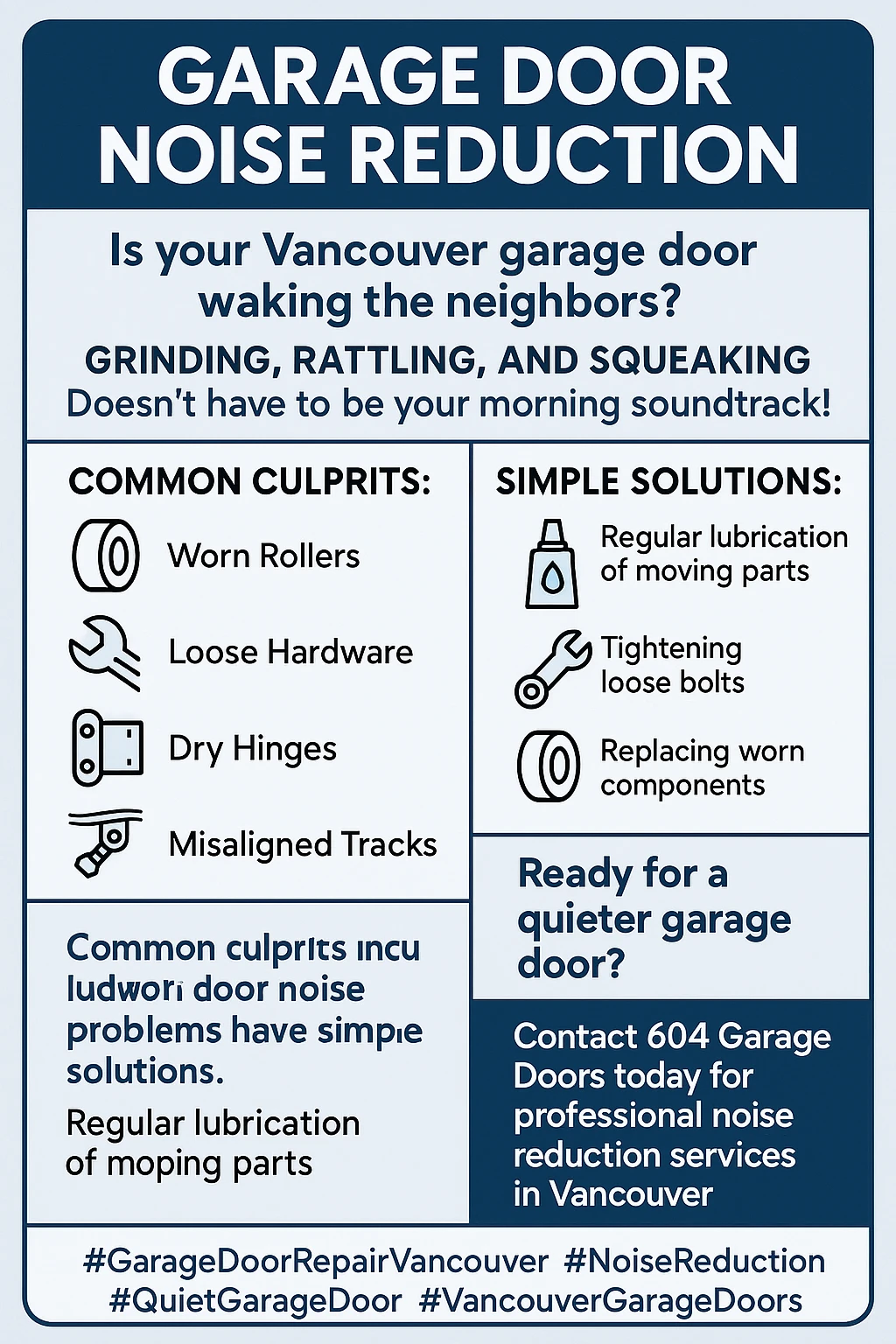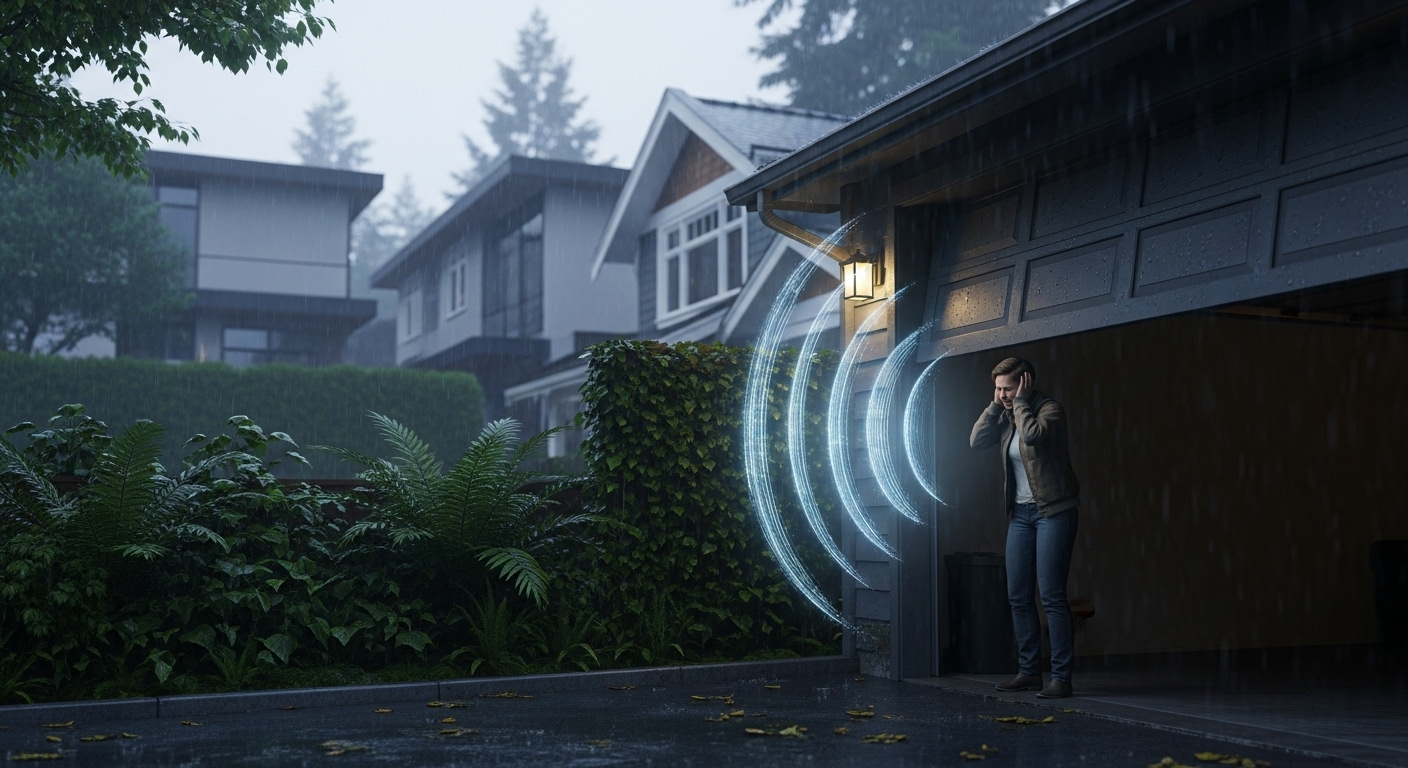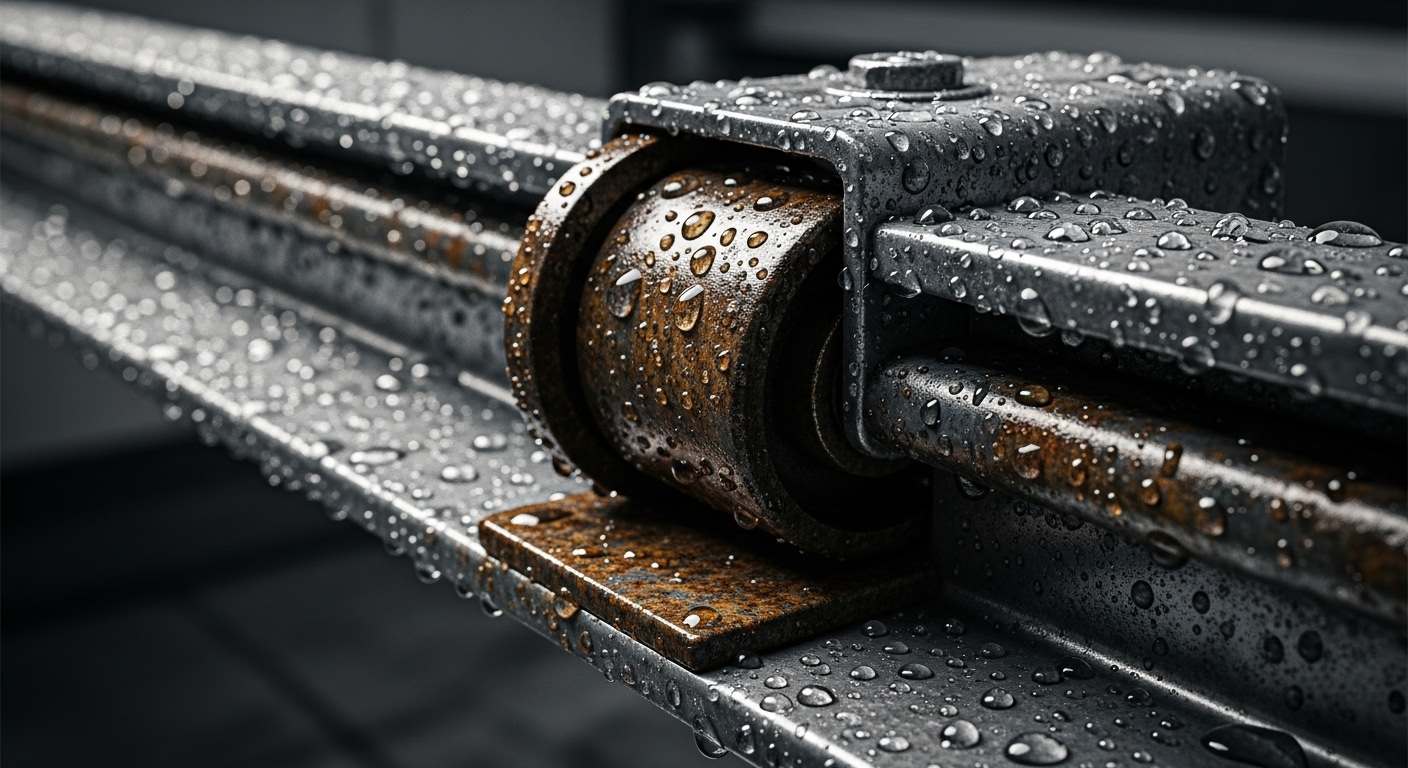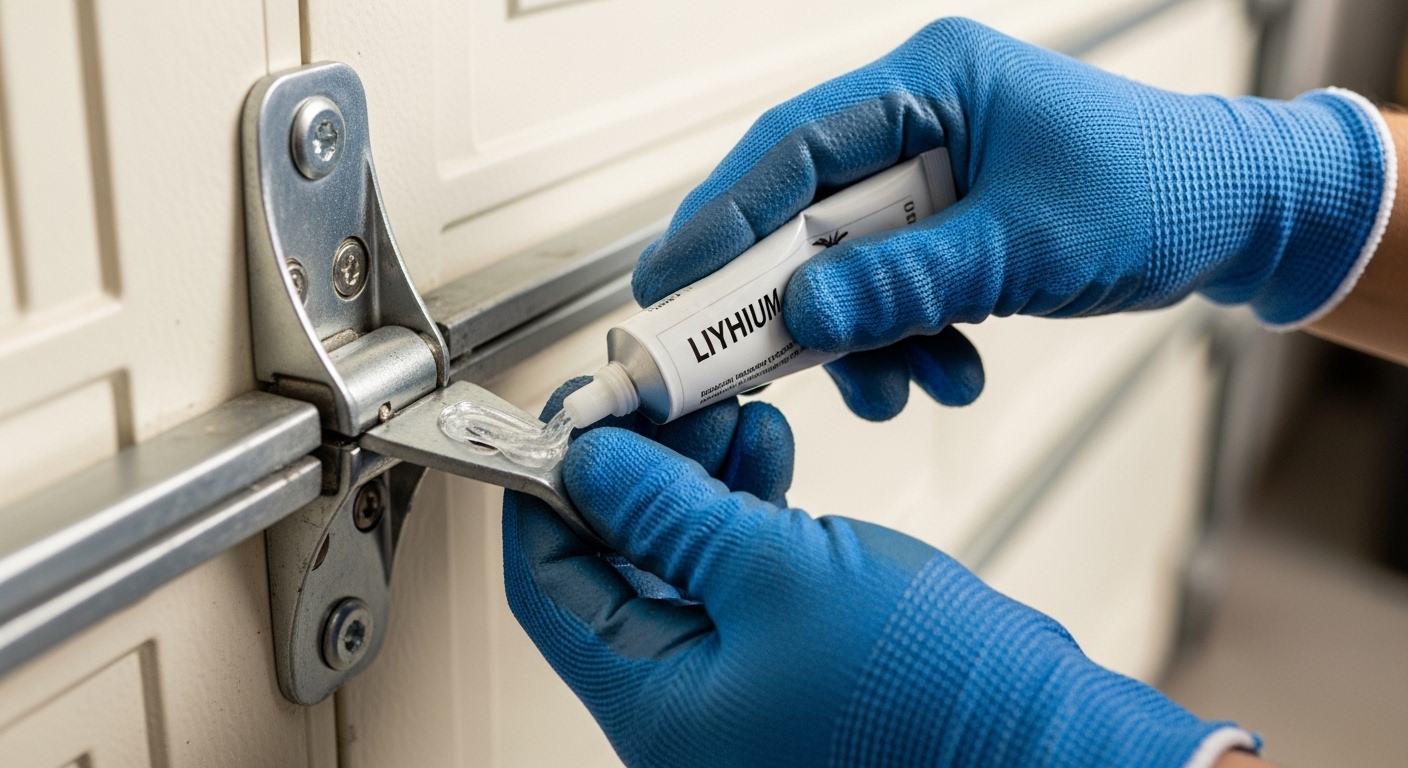Garage Door Noise Problems: Why Your Vancouver Garage Door Is So Loud and How to Silence It for Good
Dealing with a noisy garage door that’s waking up your Vancouver neighbors at 6 AM? You’re not alone – garage door noise is one of the most common homeowner complaints in our densely packed city, but the good news is that most rattling, grinding, and squeaking issues can be fixed with the right approach and a little know-how.Picture this: you’re rushing out for work on a rainy Vancouver morning, and your garage door sounds like a freight train announcing your departure to the entire neighborhood. If you live in a townhouse, condo, or any of Vancouver’s multi-unit dwellings, that mechanical symphony isn’t just embarrassing – it’s potentially violating noise bylaws and definitely not winning you any popularity contests with the neighbors. The thing is, garage doors aren’t supposed to sound like they’re auditioning for a heavy metal band. When everything’s working smoothly, your door should glide up and down with barely a whisper.Our coastal climate here in Vancouver creates some unique challenges for garage door systems that homeowners in drier regions don’t have to deal with. The constant moisture, temperature swings between seasons, and our infamous winter rain can wreak havoc on metal components, causing rust, corrosion, and premature wear that leads to all sorts of unpleasant sounds. Add in the reality that many of us are living in close proximity to our neighbors, and suddenly that squeaky garage door becomes a much bigger deal than it might be in a suburban setting with acres between houses.The good news? Most garage door noise problems are totally fixable, and many don’t even require calling in expensive repair services. Whether you’re dealing with a subtle squeak that’s getting on your nerves or a full-blown mechanical cacophony that has your neighbors giving you the stink eye, there are proven solutions that can restore peace to your morning routine and keep your garage door running smoothly for years to come.
Key Takeaways:
- Garage door noise stems from worn rollers, loose hardware, inadequate lubrication, and Vancouver’s wet climate conditions that accelerate component deterioration
- Regular maintenance every 6 months can prevent most noisy garage door issues from escalating into expensive repairs, especially important in our humid coastal environment
- Belt-drive openers reduce noise by up to 75% compared to chain-drive systems and are particularly beneficial for Vancouver’s multi-unit housing where sound carries between units
- Professional assessment is recommended for grinding sounds or spring-related issues due to safety concerns, as DIY repairs on high-tension components can be dangerous
- Vancouver’s climate requires specialized weatherproofing and more frequent maintenance to prevent moisture-related damage that contributes to increased noise levels

Understanding Vancouver’s Unique Garage Door Noise Challenges

Living in Vancouver means dealing with environmental factors that make garage door noise particularly problematic compared to other regions. Our coastal climate isn’t just about the occasional drizzle – we’re talking about sustained humidity levels, frequent temperature fluctuations, and enough moisture in the air to make metal components age faster than they would in Calgary or Phoenix. When you combine these conditions with the reality that most of us are living in close quarters with neighbors, garage door noise becomes more than just a minor annoyance.The constant exposure to moisture means that metal rollers, tracks, and springs are constantly battling rust and corrosion. Even with regular use, these components develop rough surfaces that create friction and noise as they move against each other. What starts as a barely noticeable squeak in September can become a full-blown grinding sound by February if left unchecked. The salt air from our coastal location doesn’t help matters either – it’s essentially a recipe for accelerated metal deterioration.Vancouver’s multi-unit housing market adds another layer of complexity to the noise equation. When your garage is attached to your townhouse and shares walls with your neighbors, or when you’re dealing with underground parking in a condo building, sound carries in ways that can make a noisy garage door a real quality-of-life issue. Unlike single-family homes in suburban areas where the nearest neighbor might be 50 feet away, Vancouver’s dense housing means your 6 AM garage door could be someone else’s unwanted alarm clock.The seasonal temperature swings we experience, while mild compared to other Canadian cities, still create expansion and contraction cycles in metal components. A garage door that operates perfectly in July might start making noise in December as the metal contracts and hardware loosens. This gradual process often catches homeowners off guard because the noise develops slowly over time, making it easy to ignore until it becomes truly disruptive.
Identifying the Symphony of Garage Door Sounds and Their Meanings

Not all garage door noises are created equal, and learning to identify what your door is trying to tell you can save both your sanity and your wallet. Think of it like being a detective – each sound provides clues about what’s going wrong and how serious the problem might be. The key is learning to distinguish between the “I need a quick fix” sounds and the “call a professional immediately” sounds.Squeaking and creaking noises are probably what most Vancouver homeowners encounter first. These high-pitched sounds typically indicate that moving parts need lubrication or that rubber components are starting to dry out and crack. In our humid climate, you might think everything would stay naturally lubricated, but the reality is that moisture can actually wash away the proper lubricants while introducing contaminants that make things worse. Squeaking is usually your garage door’s polite way of asking for attention before things get serious.Grinding sounds are where things start getting more concerning. This mechanical growling usually means metal is rubbing directly against metal without proper lubrication, or that components are worn to the point where they’re no longer functioning smoothly. If you’re hearing grinding noises from your tracks, rollers, or opener mechanism, you’re looking at worn parts that need replacement rather than just a quick tune-up. Grinding sounds don’t get better on their own – they only get worse and more expensive to fix.Rattling and banging sounds point to hardware problems, typically loose nuts, bolts, or mounting brackets that are allowing components to move when they shouldn’t. This is actually pretty common in Vancouver due to our building settlement patterns and the occasional seismic activity that can gradually loosen connections over time. The good news is that rattling is often one of the easier problems to fix, usually involving nothing more than a wrench and some patience to tighten everything back up.Clicking or popping sounds often indicate issues with your garage door opener itself, particularly problems with the chain, belt, or internal gears. These sounds might seem minor, but they can be early warning signs of opener failure. Given that replacing a garage door opener can run $300-800 depending on the model, paying attention to these subtle sounds can help you address problems before they become catastrophic failures.
DIY Solutions for Common Garage Door Noise Problems

Before you start dialing repair services, there are several noise-reduction strategies you can tackle yourself with basic tools and a free Saturday morning. The beauty of many garage door noise problems is that they’re often caused by simple maintenance issues that don’t require professional expertise to resolve. However, it’s important to know your limits – anything involving springs, cables, or major structural adjustments should be left to the pros.Lubrication is hands-down the most effective DIY solution for garage door noise, but there’s definitely a right way and wrong way to approach it. In Vancouver’s humid conditions, you want to use high-quality silicone-based lubricants for rubber components and white lithium grease for metal-to-metal contact points. Avoid using WD-40 or penetrating oils as your primary lubricant – while they’re great for breaking loose stuck parts, they don’t provide long-lasting protection and can actually collect dirt and debris over time.Focus your lubrication efforts on the rollers, hinges, springs, and any pivot points along the tracks. Pay special attention to the roller bearings, which tend to be noise culprits when they start running dry. For chain-drive openers, a light application of lubricant to the chain itself can dramatically reduce operational noise. Remember that less is more when it comes to lubrication – you want enough to coat the moving parts without creating a mess that attracts Vancouver’s abundant dust and pollen.Hardware inspection and tightening is another DIY win that can solve rattling and vibration issues. Grab a socket wrench set and systematically check every bolt, nut, and mounting bracket you can safely reach. Start with the track mounting brackets, roller brackets, and any hardware attaching the opener to the ceiling. Vancouver’s seismic activity and general building settlement mean that hardware naturally loosens over time, and a quarterly tightening routine can prevent many noise problems before they start.Weatherstripping replacement might not seem directly related to noise reduction, but worn weatherstripping allows sound to escape and creates air gaps that can cause whistling or vib
Pro-Level Upgrades for a Whisper-Quiet Garage Door

If you’ve tried the DIY route and your door is still making a racket, or if you’re ready to invest in a long-term solution, there are several professional-grade upgrades that can deliver a truly silent garage door experience. These solutions are particularly beneficial for Vancouver homeowners in townhouses, condos, or homes with bedrooms located directly above the garage.Replacing your existing rollers with nylon rollers is one of the most cost-effective and impactful upgrades you can make. Standard metal rollers are durable but notoriously noisy, especially as they age and corrode in our coastal climate. Nylon rollers, on the other hand, are self-lubricating, corrosion-resistant, and operate with a fraction of the noise. The difference is immediately noticeable and can reduce track noise by 50% or more. Make sure you opt for high-quality nylon rollers with sealed ball bearings for the best performance and longevity.Upgrading to a belt-drive garage door opener is the single biggest step you can take toward a silent garage door. Traditional chain-drive openers are known for their clunky, rattling operation, which can be a major source of noise pollution in attached garages. Belt-drive systems use a steel-reinforced rubber belt instead of a chain, resulting in a smooth, virtually silent operation. While they come at a slightly higher price point, the noise reduction of up to 75% makes them an essential upgrade for any noise-sensitive Vancouver homeowner.
Frequently Asked Questions About Noisy Garage Doors
- How often should I lubricate my garage door in Vancouver’s climate?Given our high humidity and frequent rain, we recommend lubricating all moving parts of your garage door every 3-4 months. A more frequent schedule prevents moisture from washing away lubricants and helps protect metal components from rust and corrosion.
- Is it safe for me to adjust or lubricate the garage door springs myself?While you can lubricate the springs with a proper garage door lubricant, you should never attempt to adjust, repair, or replace them yourself. Garage door springs are under extreme tension and can cause serious injury or even death if they snap or are handled improperly. Always call a professional for any spring-related work.
- My garage door is brand new but still seems loud. Is this normal?A new garage door shouldn’t be excessively loud. If you’re experiencing significant noise, it could be due to improper installation, unbalanced panels, or a mismatch between the door’s weight and the opener’s capacity. Contact the installation company to have them inspect the system.
- Can a new garage door opener really make that much of a difference for noise?Absolutely. Modern belt-drive openers are up to 75% quieter than older chain-drive models and are a game-changer for attached garages or multi-unit dwellings. They provide a smoother, quieter operation that significantly reduces noise transmission.
Wrapping Up: When to Call a Vancouver Garage Door Professional
While many garage door noise issues can be resolved with some basic DIY maintenance, there are certain situations where calling in a professional is not just recommended – it’s essential for your safety and the long-term health of your garage door system. If you’re hearing loud grinding or popping sounds, if your door is visibly unbalanced, or if you suspect any issues with the springs or cables, it’s time to put down the tools and pick up the phone. Attempting to repair high-tension components without proper training and equipment can lead to catastrophic failure and serious injury.A professional garage door technician in Vancouver will not only have the expertise to diagnose the root cause of the noise but will also understand how our local climate impacts component wear and tear. They can perform a comprehensive safety inspection, ensure your door is properly balanced, and recommend solutions that are tailored to the specific challenges of coastal living. Investing in a professional tune-up every year or two can prevent minor noises from escalating into major repairs, saving you money and giving you peace of mind. Ultimately, a quiet garage door isn’t just a luxury – it’s a sign that your system is operating safely and efficiently, ready to handle whatever the Vancouver weather throws at it.


